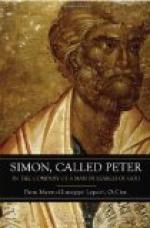It is hard and deceptive to write of those subconscious imaginings that convict the souls of most men some time or another. In that condition things are largely what we fashion them to be, and one may be thought to be asserting their ultimate truth in speaking of their influence. But there is no escaping from the fact that Peter Graham of a lost allegiance began that Sunday morning to be aware of another claimant. And this is what dawned upon him, and how.
A French memory gave him a starting-point. Here, at these Low Masses, it was more abundantly plain than ever that these priests did not conceive themselves to be serving a congregation, but an altar. One after the other they moved through a ritual, and spoke low sentences that hardly reached him, with their eyes holden by that which they did. At first he was only conscious of this, but then he perceived the essential change that came over each in his turn. The posturing and speaking was but introductory to the moment when they raised the Host and knelt before it. It was as if they were but functionaries ushering in a King, and then effacing themselves before Him.
Here, then, the Old Testament of Peter’s past became to him a schoolmaster. He heard himself repeating again the comfortable words of the Prayer-Book service: “Come unto Me....” “God so loved....” “If any man sin....” Louise’s hot declaration forced itself upon him: “It is He Who is there.” And it was then that the eyes of his mind were enlightened and he saw a vision—not, indeed, of the truth of the Roman Mass (if it be true), and not of the place of the Sacrament in the Divine scheme of things, but the conception of a love so great that it shook him as if it were a storm, and bowed him before it as if he were a reed.
The silent, waiting Jesus.... All these centuries, in every land.... How He had been mocked, forgotten, spurned, derided, denied, cast out; and still He waited. Prostitutes of the streets, pardoned in a word, advanced towards Him, and He knew that so shortly again, within the secret place of their hearts, He would be crucified; but still He waited. Careless men, doubtless passion-mastered, came up to Him, and He knew the sort that came; but still He waited. He, Peter, who had not known He was here at all, and who had gone wandering off in search of any mistress, spent many days, turned in by chance, and found Him here. What did He wait for? Nothing; there was nothing that anyone could give, nothing but a load of shame, the offering of a body spent by passionate days, the kiss of traitor-lips; but still He waited. He did more than wait. He offered Himself to it all. He had bound Himself by an oath to be kissed if Judas planned to kiss Him, and He came through the trees to that bridal with the dawn of every day. He had foreseen the chalice, foreseen that it would be filled at every moon and every sun by the bitter gall of ingratitude and wantonness and hate, but He had pledged Himself—“Even so, Father”—and He was here to drink it. Small wonder, then, that the paving on which Peter Graham knelt seemed to swim before his eyes until it was in truth a moving ocean of love that streamed from the altar and enclosed of every kind, and even him.




